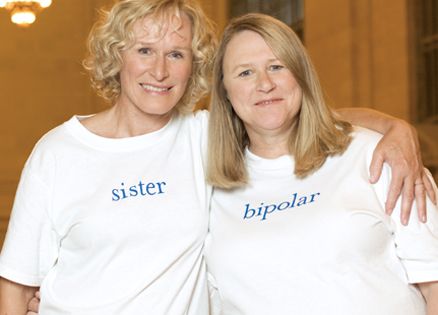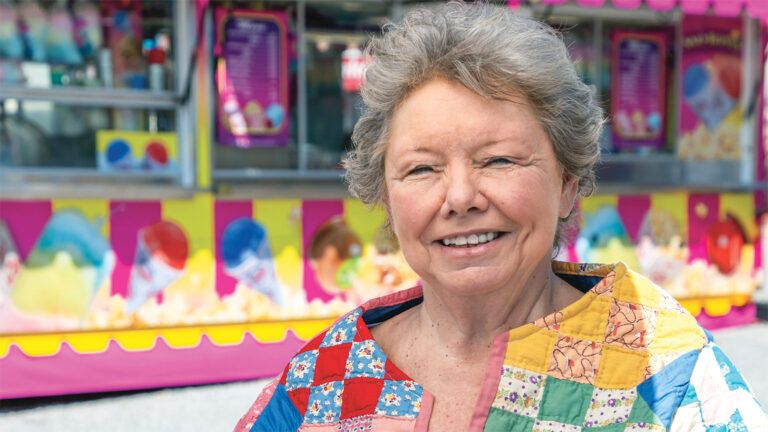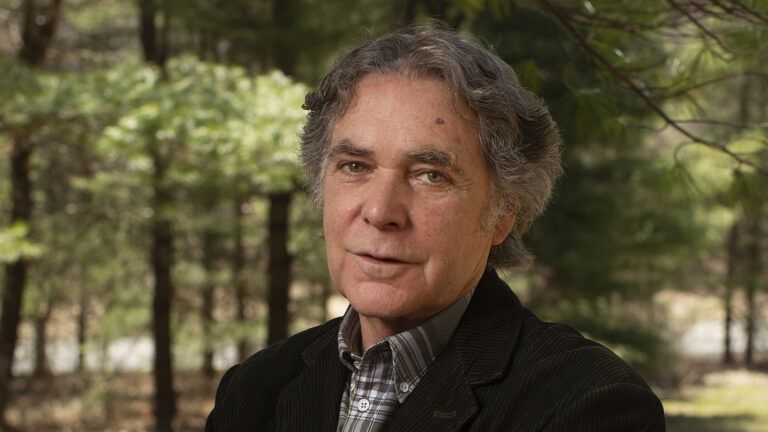Grand Central Station.
More than half a million people come through here every day, people of all ages and backgrounds, all walks of life. You can’t necessarily tell from the outside–the clothes they wear, the things they carry, even the way they act–what’s going on with someone inside–the struggles they face, the loneliness they feel, the hope and understanding they seek.
That’s why I’m here. I’ve learned that one in four adults has a mental illness–such as depression, bipolar disorder, PTSD or schizophrenia–and the stigma can be as daunting as the disease itself.
I’m filming a public-service announcement to get people talking openly about mental illness. Lights are set up, extension cords snake across the floor, thousands of voices echo beneath the vaulted ceiling. All at once I hear a lone voice through the din.
“Ms. Close?” A woman I don’t know comes up to me. “Thank you,” she says, “for what you’ve done for the mentally ill.” Then a little more hesitantly, “We have mental illness in my family.”
I look at her, imagining the turmoil she and her family have been through. There is a lot I could say, but one thing in particular I want to know, as much for her as for me. “What kind of mental illness?” I ask.
Words are powerful. They can shroud a problem in secrecy or bring it into the bold light of day. I admire this woman’s courage for speaking out. Now I hope she can tell me, what specific diagnosis? If you can give something a name, you can stop being afraid of it and start dealing with it. I should know. There is mental illness in my own family.
I grew up in an idyllic corner of Connecticut, one of four kids. We lived right next to my grandmother’s house amidst acres of rolling fields. We would take the train to New York City and walk through Grand Central Station, dressed in our Sunday best, to go to the circus or get our eyes checked. If you look at photos of us from back then, we seem like the perfect family, healthy and happy. And in many ways, we were blessed. But there were also things that weren’t right, things that were rarely, if ever, spoken of.
Relatives who overindulged in alcohol. An uncle who took his own life. My maternal grandmother’s stays at a place called Silver Hill. She was kind and fey and went to the church up the road on Sundays, except for those weeks she was “resting” at Silver Hill. I thought it was a spa of some sort (it looked like a spa). It wasn’t until years later that I discovered it was a psychiatric hospital. No one ever called it that and the reason she went there was one of those well-kept family secrets.
My father was a doctor, a man dedicated to helping others–he spent years running a hospital in Africa. Yet we never dreamed of asking him what was wrong. We wouldn’t have known what to say. We didn’t have the vocabulary. Some things were too scary to talk about.
My younger sister, Jessie, was bright and imaginative. She told magical stories, even as a little girl, and could completely lose herself in a book. She also had a habit of rubbing the loose skin between her thumb and forefinger until it became raw and crusty. Odd behavior. Disturbing.
But the adults around us never commented on it. Even when more obvious and ominous signs of trouble came in her teens–Jess got into alcohol and drugs–no one mentioned the possibility that she might be trying to blunt some unbearable psychological pain. Instead, we chalked her behavior up to her being “wild” and “original.”
Jess dropped out of school, overdosed a couple times, wrecked relationships, veering from dark spells to hyper-energetic highs. Yet she was a devoted mom to her three kids, and she never lost that incredible creative spark. She kept writing, even published a novel.
I was launching my acting career, rushing to auditions or rehearsals. If you asked me about mental illness back then, I would have pointed to the street people in the theater district. The man singing out-of-tune arias in front of Carnegie Hall. The bald fellow who drew hair on his head with a black marker and drummed on the sidewalk with a ragged pair of drumsticks. Celia, who hung out by the stage door, calling to me, “Miss Close, Miss Close, are you an actress?”
I played some deeply troubled characters. Blanche DuBois in A Streetcar Named Desire, Norma Desmond in the musical version of Sunset Boulevard. And, of course, Alex Forrest in the movie Fatal Attraction.
When I was cast as Alex, one of the first things I did was have a psychiatrist look at the script. “Why would a woman behave like this?” I asked him. I didn’t want her to be a caricature. I wanted to understand her, empathize with her. The psychiatrist suggested Alex might have suffered some childhood trauma; others diagnosed borderline personality. Those insights helped me make the character real.
It might seem strange that I didn’t connect these psychological profiles to behavior patterns in my own family. But it wasn’t until nine years ago that the reality of mental illness hit home. Jess had been worried about her 19-year-old son. “All I knew was Calen wasn’t Calen anymore” was the way she put it.
He finally opened up to her about the delusions he was having. He was diagnosed with schizoaffective disorder, a combination of schizophrenia and bipolar disorder. He checked into McLean Hospital in Massachusetts for psychiatric treatment. At least Jess was doing well, I thought. She’d gotten sober with the help of a 12-step program. She seemed strong enough to face what was happening to her son.
Then Jess shook my world. One day she sat my mother and me down and said, “I need help.” I assumed she was talking about Calen. “I need help for myself,” she went on. “I should check into McLean too.” She said that in talking to Calen and his doctors about his illness, she’d been hit with the shock of recognition. She had some similar symptoms.
I took my sister to McLean. On the long drive there, we talked with an openness that brought an incredible sense of relief after a lifetime of keeping secrets. “I’m glad I’ve been sober for a while,” Jess said. “I couldn’t have done this without those years of AA.” Working the 12 steps, trusting in a Higher Power, had given her the courage to change.
I found myself rethinking generations of family history. My mom’s half-brother who’d committed suicide, why hadn’t anyone talked about depression? The relatives who lived for their cocktails, why didn’t we acknowledge they were alcoholics? My grandmother and her mysterious trips to Silver Hill. My sister with those red flags we had missed. Why couldn’t we speak up? Why were we in such denial? Though my family had a tradition of helping others, we had overlooked the help we needed for ourselves.
Jess’s doctor at McLean found medication that transformed her life. He put a name to what she suffers from: bipolar disorder. That explained her unusual emotional shifts from manic periods of euphoria and creativity to those deadening depressions she’s described as “sheer blackness.”
My sister and my nephew have become extraordinary advocates for people with mental illness. As Jess says, “I am not my disease.” She is simply someone who is being treated for a disease, an illness with a biological basis like cancer or diabetes.
Jess and Calen are my heroes. They have inspired me to take on a new role. First I got involved with the New York City-based organization Fountain House. They have a center where people with mental illness can go for help with education, jobs and housing and, most important, for community.
I wanted to dig deep, as though I were researching a part. I asked to volunteer with Fountain House’s members. Many sign up for vocational training and I was to arrange flowers with one group.
At first, I’ll admit, I was a little wary. What was I going to say? But pretty soon, I realized I could talk about what I’d talk about with anyone–the weather, the flowers we were working with, the Mets.
Words that seemed scary–schizophrenic, depressive, bipolar–lost their power the more I heard them. That got me wondering if we could help remove the stigma from mental illness by talking openly about it.
A group of us worked with several major mental health organizations and launched a national campaign, BringChange2Mind.org.
I asked Jess and Calen if they’d appear in a public-service announcement. They didn’t hesitate. Neither did my daughter Annie nor Jess’s daughter Mattie. (My mother said she wished she could be there too to make it three generations.)
We brainstormed ideas about where to film, and kept coming back to Grand Central Station. More than half a million people rushed through every day, thousands of them living with a mental illness.
How many were suffering in silence, feeling isolated not just by their disease but also by the burden of keeping it a secret?
That’s why I asked the woman who stopped to talk to me about the specific diagnosis in her family. Acknowledge a problem, give it a name and you can deal with it. You can treat it. You can understand it. Recovery is possible.
And that’s also why for the filming everyone in the PSA is wearing T-shirts that say who we are. No more hiding. No more distancing ourselves. No more secrets.
Calen’s shirt says “schizophrenic,” Jess’s says “bipolar,” Annie’s says “cousin,” Mattie’s says “sister” and so does mine. No one’s going to give me an Academy Award for it, but it’s my most important role.
Watch Glenn and Jessie’s PSA below.






